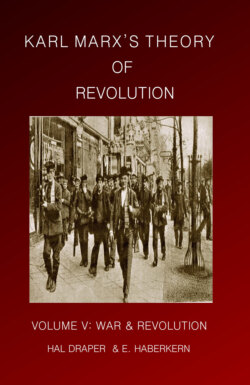Читать книгу Karl Marx’s Theory of Revolution Vol V - Hal Draper - Страница 17
На сайте Литреса книга снята с продажи.
4. War With Russia
ОглавлениеThere were three incidents which forced the Frankfurt Assembly to face up to the prospect of war with Russia. In each case, the Assembly backed off. And, in each case, the result was a weakening of the Assembly itself within Germany.
The incident that caused the most trouble, naturally, concerned the Poles. The problem was: what to do with the large chunk of Poland that had been seized by the Kingdom of Prussia? The proposal debated by the Frankfurt Assembly, the proposal that eventually passed, Engels rightly called a new partition of Poland. Poland was to be reduced to a strip of land on the fringe of the Russian occupied area. A new Duchy of Posen(present day Poznán) was to become part of the German Confederation.
This decision was presented as a defense of the national rights of the alleged half-million German speaking inhabitants of Posen. Included in this total were some 80,000 allegedly German-speaking Jews. Although they probably spoke Yiddish rather than German and would have been deprived of civic rights in the German states because of their religion, in the debates of the Assembly they became representatives of German culture.
Engels’ reports on the debates are an extended and detailed comment on his 1847 thesis that Germany could only be free if she renounced all claims to Poland.
So long, therefore, as we help to subjugate Poland, so long as we keep part of Poland fettered to Germany, we shall remain fettered to Russia and to the Russian policy, and shall be unable to eradicate patriarchal feudal absolutism in Germany. The creation of a democratic Poland is a primary condition for the creation of a democratic Germany.15
There was, of course, plenty of rhetoric in favor of Polish freedom in the debates of the Assembly. The cause of Polish freedom was also dear to middle class public opinion. Engels reports on touching demonstrations of this concern such as the rallies and speeches praising Polish freedom fighters as they passed through railway stations. Practical steps to end the occupation of part of Poland by Prussian troops, however, would certainly turn the area into a staging ground for a Polish insurrection in Russian and Austrian occupied Poland.
. . . but to start a war with Russia, to endanger the European balance of power and, to cap it all, hand over some scraps of the annexed territory—only one who does not know the Germans could expect that.
And what would a war with Russia have meant? A war with Russia would have meant a complete, open and effective break with the whole of our disgraceful past, the real liberation and unification of Germany, and the establishment of democracy on the ruins of feudalism and on the wreckage of the short-lived bourgeois dream of power. War with Russia would have been the only possible way of vindicating our honor and our own interests with regard to our Slav neighbors, and especially the Poles. . . . We shrank from it and the inevitable happened—the reactionary soldiery, beaten in Berlin, raised their head again in Posen; under the pretext of saving Germany’s honor and national integrity they raised the banner of counterrevolution and crushed our allies, the revolutionary Poles.16
Engels in these reports ridicules the claims put forward on behalf of the German-speaking minority in Poland. Had the German revolution from the beginning come out for Polish independence and backed the demand up by force of arms, the matter of border disputes would have been a minor issue. “. . . both parties would have had to make some concessions to one another, some Germans becoming Polish and some Poles German, and this would have created no difficulties.”17
Even at the relatively late date when Engels was writing he still believed that the Assembly could have mended matters. They could have excluded Posen from the German Confederation and dealt with the reconstituted Poland as an equal in negotiations over the fate of the German-speaking minority.18 The Frankfurt Assembly was not even up to that. It annexed Posen to Germany which meant it left it in control of Prussian troops. These were the same mercenaries who were later to be used to disperse the Assembly itself. Bohemia, Poland and Italy became the training ground for the counterrevolution in Germany.
